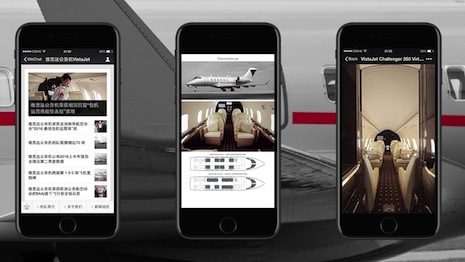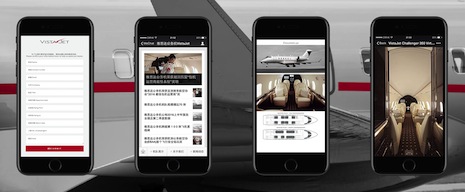 VistaJet's WeChat
VistaJet's WeChat
Global aviation firm VistaJet is looking to usher in bookings from China’s digitally savvy consumers through a conversational commerce endeavor with a potential to tap a large audience.
WeChat, Chinese consumers' predominant platform in communicating with brands and retailers, will house VistaJet's newest sales platform. The aviation firm is hoping to increase bookings with convenience by tapping into an already established user behavior.
“For VistaJet, being global means not only flying our customers anywhere they wish to go to, but also creating a service dedicated to regional cultural demands,” said Thomas Flohr, founder and chairman of VistaJet. “Our Chinese consumers don’t tend to use email as a primary communication tool and instead pointed us to the incredible popularity of WeChat.
“Launching a WeChat service is a huge opportunity to allow people to talk to our team – anytime, anywhere – and enable us to provide Chinese customers with the best experience in the industry,” he said.
WeChat in China
VistaJet’s presence in China only began in 2015, but it has contributed greatly to the company’s growth. Last year the firm saw 23 percent growth in flight traffic, which China was a significant part of.
VistaJet's WeChat
More than 17 percent of VistaJet’s customer base comes from the Greater China area.
The majority of consumers in China are using mobile messaging application WeChat as their sole source for interaction with brands, daily tasks and communication with others, and marketers are learning how to leverage this to their advantage and recreate this tactic overseas.
WeChat is now seeing double adoption rates within two years, according to a new report from L2, also showing that now all beauty brands, 96 percent of personal care brands and 90 percent of watch and jewelry manufacturers interact with consumers. Brands in China are serving consumers' needs through the mobile messaging platform, a strategy that can be and should be recreated in the United States (see more).
VistaJet and WeChat
The pervasiveness of the mobile app paired with the company’s growth in China prompted the brand to launch its account on WeChat.
Users will be able to book one-off charter flights and blocks of flying hours via VistaJet’s Program product at all times.
The platform will connect users with sales associates available to help them book through messaging.
Image courtesy of VistaJet
In-flight passengers will also be able to request Mandarin and Cantonese-speaking cabin staff and order dining options from restaurants or hotels.
In 2014 about 71 percent of beauty brands in China had a presence on WeChat, but in 2016 that number hit max adoption with 100 percent of brands being on the mobile messaging app.
Personal care brands jumped 35 percent in two years, with only 56 percent of brands interacting with consumers on WeChat in 2014. Fashion brands saw the most growth within two years, with a 48 percent increase since 2014. Two years ago only 42 percent of fashion manufacturers were on WeChat, but this year that percentage reached 90 (see more).
“VistaJet has enjoyed a successful relationship with China since the company’s creation in 2004,” Mr. Flohr said. “China is a priority market for us and is driving the increasing demand and double-digit growth VistaJet has enjoyed every year.
“Last year, 40 percent of VistaJet’s new business came from customers moving away from fractional or full aircraft ownership and we are now seeing this reflected in China,” he said. “For Chinese customers who require guaranteed aircraft availability 365 days a year, WeChat could genuinely become an alternative to ownership – merely instant message our team, and we’ll organize the rest, to your own specific taste.”

